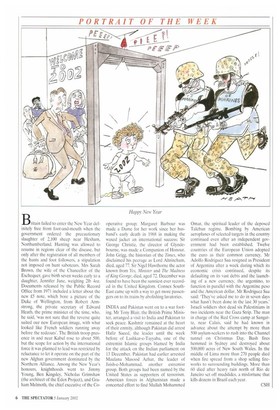PORTRAIT OF THE WEEK
Happy New Year Britain failed to enter the New Year definitely free from foot-and-mouth when the government ordered the precautionary slaughter of 2,100 sheep near Hexham, Northumberland. Hunting was allowed to resume in regions clear of the disease, but only after the registration of all members of the hunts and foot followers, a stipulation not imposed on hunt saboteurs. Mrs Sarah Brown, the wife of the Chancellor of the Exchequer, gave birth seven weeks early to a daughter, Jennifer Jane, weighing 21b 4oz. Documents released by the Public Record Office from 1971 included a letter about the new .E5 note, which bore a picture of the Duke of Wellington, from Robert Armstrong, the private secretary of Edward Heath, the prime minister of the time, who, he said, 'was not sure that the reverse quite suited our new European image, with what looked like French soldiers running away before the redcoats'. The British troop presence in and near Kabul rose to about 500, but the scope for action by the international force it was planned to lead was restricted by reluctance to let it operate on the part of the new Afghan government dominated by the Northern Alliance. Among the New Year's honours, knighthoods went to Jimmy Young, Ben Kingsley, Nicholas Grimshaw (the architect of the Eden Project), and Graham Melmoth, the chief executive of the Co
operative group: Margaret Barbour was made a Dame for her work since her husband's early death in 1968 in making the waxed jacket an international success; Sir George Christie, the director of Glyndebourne, was made a Companion of Honour. John Grigg, the historian of the Times, who disclaimed his peerage as Lord Altrincham, died, aged 77. Sir Nigel Hawthorne the actor known from Yes, Minister and The Madness of King George, died, aged 72. December was found to have been the sunniest ever recorded in the United Kingdom. Connex SouthEast came up with a way to get more passengers on to its trains by abolishing lavatories.
INDIA and Pakistan went on to a war footing. Mr Tony Blair, the British Prime Minister, arranged a visit to India and Pakistan to seek peace. Kashmir remained at the heart of their enmity, although Pakistan did arrest 1-lafiz Saeed, the leader until the week before of Lashkar-e-Tayyaba, one of the extremist Islamic groups blamed by India for the attack on the Indian parliament on 13 December. Pakistan had earlier arrested Maulana Masood Azhar, the leader of Jaish-e-Mohammad, another extremist group. Both groups had been named by the United States as supporters of terrorism. American forces in Afghanistan made a concerted effort to find Mullah Mohammed Omar, the spiritual leader of the deposed Taleban regime. Bombing by American aeroplanes of selected targets in the country continued even after an independent government had been established, Twelve countries of the European Union adopted the euro as their common currency. Mr Adolfo Rodriguez Saa resigned as President of Argentina after a week during which its economic crisis continued, despite its defaulting on its vast debts and the launching of a new currency, the argentin°, to function in parallel with the Argentine peso and the American dollar. Mr Rodriguez Saa said: 'They've asked me to do in seven days what hasn't been done in the last 30 years.' Israeli soldiers shot dead six Palestinians in two incidents near the Gaza Strip. The man in charge of the Red Cross camp at Sangatte, near Calais, said he had known in advance about the attempt by more than 500 asylum-seekers to rush into the Channel tunnel on Christmas Day. Bush fires hemmed in Sydney and destroyed about 500,000 acres of New South Wales. In the middle of Lima more than 270 people died when fire spread from a shop selling fireworks to surrounding buildings. More than 60 died after heavy rain north of Rio de Janeiro set off mudslides, a misfortune that kills dozens in Brazil each year.
CSH






















































 Previous page
Previous page